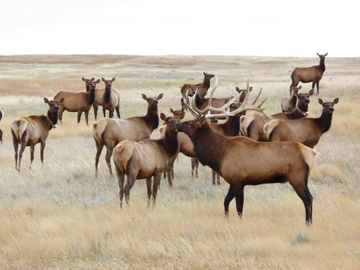Current Temperature
23.4°C
Bovine TB cases puts 30 SE Alberta ranches into quarantine
Posted on November 1, 2016 by 40 Mile Commentator File Photo
File PhotoBy Collin Gallant
Southern Alberta Newspapers
The Canadian Food Inspection Agency is now contacting all ranchers across southeast Alberta, updating them on its investigation into a single case of bovine tuberculosis found near Jenner.
Federal officials say only 30 ranches are under quarantine, but operations in northern Cypress County, the County of Newell, the Special Areas and the MD of Acadia Valley are being updated about the issue and investigation.
They are attempting to trace animals back to possible exposure points at “individual premises” or grazing blocks at Buffalo-Atlee and Suffield Block.
At the same time, beef industry officials are stressing that procedures in place to protect cattle and consumers are working as planned, but not as quickly as they would hope.
Rich Smith, executive director of the Alberta Beef Producers, said a speedy conclusion is required to limit fallout for ranchers with herds are under quarantine.
“It’s a very low risk to human health, that’s the nature of the disease,” said Smith.
But while it should not affect Canada’s status as a TB-free jurisdiction, having greater trade implications “for the producers who are affected, it’s devastating,” he said.
The timing comes at a particularly bad time in the agriculture sector’s business cycle, said Smith.
“They’re caught in a terrible position; because they always sell calves in the fall, they have no facilities to hold calves, no feed to feed them, and because they haven’t made sales, they have no money to purchase feed.”
The organization is asking for the CFIA to speed up its efforts to conclude the investigation, triggered by a U.S. inspector on Sept. 19.
“We’re encouraging them to bring whatever resources they need to bear,” said Smith. “We’re asking the provincial government to provide assistance for those producers.”
Alberta’s chief veterinarian’s office told the News the CFIA is the lead agency handling the situation. Alberta’s agriculture ministry said it is monitoring the situation closely.
“We understand the urgency of the situation and we continue to have ongoing communication with the federal government,” said Carlier in a statement. “We are working with them regarding what programs may be available so we can determine the best course of action to meet the needs of producers.”
See Isolated, Page A2
Carlier also said isolated cases of bovine TB are periodically reported in Alberta and elsewhere in Canada.
Inspectors with the U.S. Department of Agriculture found the infection in a single animal that had arrived in that country for slaughter. Canadian officials traced the animal’s origin to a ranch near Jenner. That issue was first made public in a CFIA bulletin on Oct. 19.
Officials say they are still attempting to determine how the disease — which has been the target of an eradication program for decades — has resurfaced here.
However, widespread speculation is that the disease, which is rare and commonly spread by elk, originated in a large herd that roams on the sprawling military base northwest of Medicine Hat.
Since the late 2000s, ranchers have complained to several levels of government that the size of the herd has grown from 200 in 1998 to near 7,000 recently. That has led to broken fences, damaged crops and risks to livestock.
A special hunting tag draw over the last several years has dropped the head count to an estimate 6,700. Left unchecked, Alberta game officials say the herd would have grown to 10,000 by next year. This year’s special hunt is set to begin on Nov. 4 and continue in blocks until Jan. 28.
The last major case of bovine TB involved an elk herd near Riding Mountain National Park in central Manitoba in 2011. Since then, ranchers there have been part of continued testing.
If animals are ordered destroyed, producers are eligible for compensation.
Leave a Reply
You must be logged in to post a comment.

